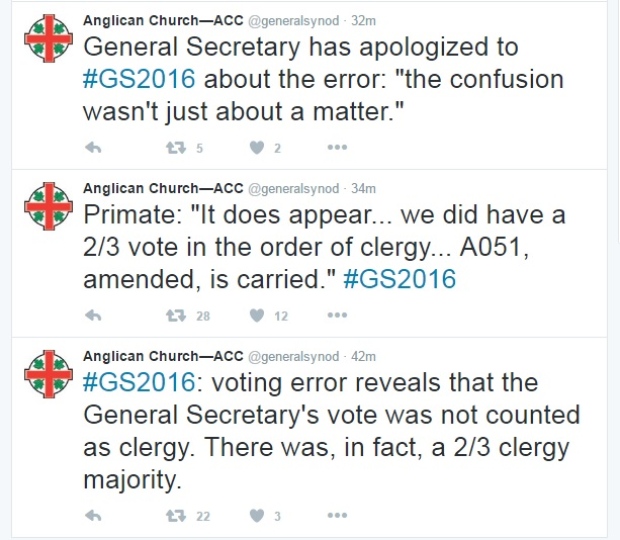It has now emerged that Bishop Mark MacDonald was registered as a non-voting attendee so none of his votes counted during the synod. Yes, the clowns really are running the synod circus.
I know whether the marriage canon vote passed or not doesn’t really make much difference, since liberal bishops are determined to plough ahead no matter what anyone votes, says or does, but surely this latest revelation makes a mockery of the whole process and, since this could be the tip of a very ugly iceberg, invalidates every decision that was made.
Laughably, some from the ACoC turned up at the El Salvador presidential elections in 2014 to make sure everything was above-board. It would be only fair, I think, to invite Salvador Sánchez Cerén, El Salvador’s president, to return the favour and scrutinise the results of the 2019 synod.
From, here:
The National Indigenous Anglican Bishop erroneously listed as non-voting at the General Synod 2016
In the process of reviewing the list of those voting at the General Synod, it has come to my attention that, in addition to myself and the chancellor, one other voting member was wrongly listed as non-voting in the spreadsheet provided to Data-on-the-Spot. The National Indigenous Anglican Bishop, the Rt. Rev. Mark MacDonald, was erroneously listed as non-voting and I only discovered this error a number of days after the end of synod. As a result of this error, none of Bishop Mark’s votes during the synod was recorded electronically.
What we did know during the synod was that Bishop MacDonald approached the head-table following the release of voting information for the motion to revise the Marriage Canon. At this time, he informed the primate that he had voted “no”.
If Bishop Mark’s vote were to have been be registered, it would not have changed the outcome of the motion. It would have increased the number of opposed in the order of bishops from 12 to 13 total (one-third of bishops present and voting). The number of bishops in favour would still have met the legislative threshold of two-thirds.
I have spoken with and apologized personally to Bishop MacDonald, and he has been gracious and understanding. We are all deeply grateful to Bishop Mark, and to all those with whom he works, for the emerging clarity in the Indigenous Spiritual Ministry of the Anglican Church of Canada.
I will seek the advice of the Chancellor of General Synod, and present a full report of all voting issues and recommendations of any possible mitigation, to the Council of General Synod at its first meeting this fall.
The integrity of voting at General Synod has come perilously close to breaking. I am grateful to all who have helped us understand where and how that integrity was put at risk. With that information, we can both correct mistakes and, for future General Synods, learn how errors can be avoided.
Yours faithfully,
Michael Thompson, General Secretary
Why are there no calls for Michael Thompson’s resignation?



